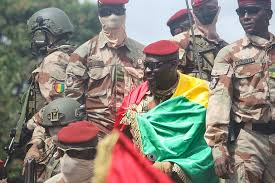
Transitional President Mamadi Doumbouya has announced that the country’s presidential election will take place on December 28, 2025, signalling an accelerated political transition.
The move comes just days after the Supreme Court validated a new Constitution, raising both hopes and concerns about the nation’s democratic trajectory.
The announcement marks a rapid series of political developments in Guinea: the results of the constitutional referendum were proclaimed, the new Basic Law promulgated, the electoral code adopted, and now the election date set.
Officially approved by 89% of voters, the new Constitution introduces a seven-year presidential term, renewable once, and notably opens the door for members of the military junta to run for office—a provision previously prohibited. While Doumbouya has not declared his candidacy, critics argue the text appears tailored to facilitate his potential run.
Traditional opposition parties, including Cellou Dalein Diallo’s UFDG and Alpha Condé’s RPG, face significant challenges.
Repression, internal divisions, and the exile or surveillance of key leaders have weakened their capacity to mobilise effectively. Civil society groups have denounced a “confiscation of the process,” expressing scepticism over the announced election.
Many in Conakry question the official 92% turnout reported for the September 21 referendum, describing it as inconsistent with observations at polling stations.
Amnesty International has welcomed the accelerated timetable but condemned the continued climate of repression and restricted freedom of expression.
The December election carries both international and domestic implications. Guinea, Africa’s leading bauxite exporter and home to the massive Simandou iron ore deposit, attracts foreign investment, particularly from China.
A vote before year-end could provide Doumbouya with a measure of international legitimacy, potentially easing pressure from regional and Western partners.
However, past elections in Guinea have often triggered post-election violence, and Doumbouya’s involvement could heighten internal tensions if his candidacy is confirmed.
As Guinea approaches the December 28 vote, the nation faces a critical juncture. Observers note that each post-independence transition has ultimately seen power consolidated by incumbents.
Whether Doumbouya honours the commitments of the transitional period or continues the historic cycle of contested power remains uncertain, leaving the country’s political future in delicate balance.



